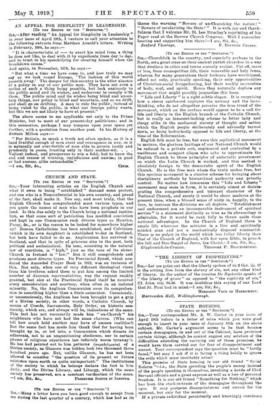AN APPEAL FOR SIMPLICITY IN LEADERSHIP. [To un Emma or
um " SPIMT1Ten."1
See,—After reading "An Appeal for Simplicity in Leadership " in your issue of April 19th, I venture to call your attention to the following extracts from Matthew Arnold's letters. Writing in February, 1884, he says:- " It is characteristic of — to avert his mind from a thing he does net like, to deal with it by expedients from day to day, and to trust to his speechifying for clearing himself when the breakdown comes."
And again, in November, 1870, he says:—
" But what a time we have come to, and how truly we may say as we look round Europe, The fashion of this world passeth away.' The danger for this country is the utter absence of a policy in any of our public men. They have not even a notion of such a thing being possible, but look anxiously to the public mind and its wishes, and endeavour to comply with them. The public mind and its wishes being blind and uncer- tain things, our policy is blind and uncertain, and so we drift, and shall go on drifting. A man to rule the public, instead of being ruled by the public, is what our foreign policy wants, but this we are not likely to have at present."
The above seems to me applicable not only to the Prime Minister, but to most of our present-day politicians; and in this connexion, perhaps I may trespass upon your space yet further, with a quotation from another poet. In his History of Britain Milton says:- " For Britain, to speak a truth not often spoken, as it is a land fruitful enough of men stout and courageous in war, so it is aaturally not over-fertile of man able to govern justly and prudently in peace, trusting only to their mother-wit. . . . Valiant indeed, and prosperous to win a field; but to know the end and reason of winning, =judicious and =wilier. in good or bad success,. alike =teachable."


































 Previous page
Previous page